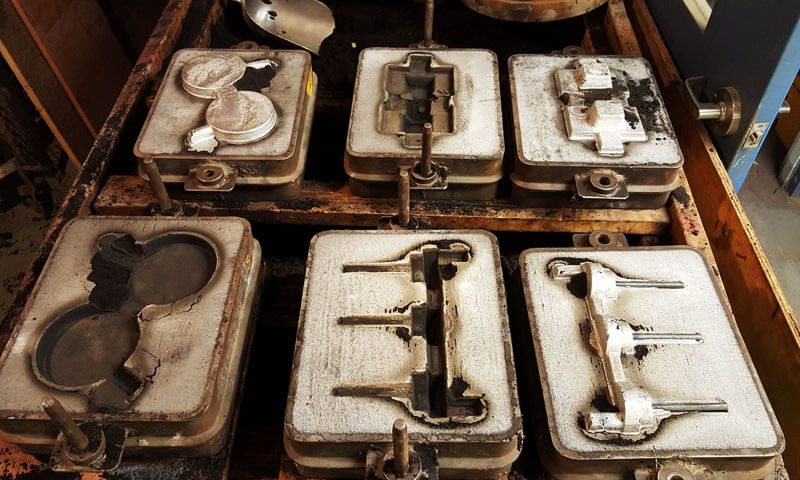Learn how an Aluminum Casting Company ensures precision in every project
Best Practices for Maintenance and Applications in the Light Weight Aluminum Shop Industry: A Thorough Introduction
Keeping tools in the aluminum factory industry is necessary for operational success. Regular examinations and predictive maintenance can significantly minimize downtime and enhance safety. Advanced technologies, such as IoT and information analytics, play a crucial duty in this process. Nonetheless, comprehending the complete extent of best practices needs a more detailed assessment of certain methods and their effect on performance. What are the crucial parts that add to a reputable upkeep structure?
Significance of Regular Maintenance in Light Weight Aluminum Foundries
Routine upkeep plays an essential role in the effective procedure of light weight aluminum foundries. By methodically servicing and inspecting equipment, foundries guarantee peak efficiency and long life of equipment. Regular upkeep activities, such as cleansing, part, and lubrication substitute, help stop unexpected malfunctions that can result in costly downtime.
Routine checks improve office safety and security by determining prospective risks before they intensify into serious concerns. Tools that is well-kept operates extra efficiently, bring about boosted item quality and lowered waste. In addition, adherence to an organized maintenance schedule can support compliance with market regulations, thus fostering an online reputation for dependability and top quality within the market.
Executing Anticipating Maintenance Techniques
Anticipating maintenance methods take the concepts of routine maintenance a step better by leveraging data analytics and advanced surveillance innovations. In light weight aluminum factories, these methods enable operators to anticipate equipment failures before they take place, thus lowering unplanned downtimes and maximizing functional efficiency. By utilizing sensors and IoT tools, real-time data can be gathered on machine performance, allowing for the recognition of possible issues via predictive analytics.
Enhancing Melting and Pouring Processes
Efficient melting and pouring processes are vital for optimizing performance and ensuring the quality of light weight aluminum spreadings. To improve these processes, shops should concentrate on exact temperature control throughout melting, as this straight impacts the metallurgical buildings of the alloy. Using advanced melting innovations, such as induction and resistance melting, can improve power efficiency and minimize cycle times.
Additionally, carrying out automated putting systems lessens human error and keeps uniformity in the pouring process. Proper mold preparation, including adequate preheating, is vital to protect against thermal shock and improve mold and mildew durability.

Enhancing Safety And Security Protocols in Factory Procedures
Prioritizing safety and security in aluminum shop procedures is essential for safeguarding employees and assuring an effective environment. Reliable safety and security methods include normal training sessions that stress the relevance of individual protective tools (PPE), such as goggles, handwear covers, and helmets. In addition, the facility of clear emergency treatments is important in managing potential mishaps.
Normal examinations of equipment and equipment assistance recognize dangers prior to they intensify into serious concerns. Carrying out a durable coverage system urges employees to communicate safety worries without fear of effect. Fostering a culture of safety great site and security guarantees that every staff member understands their duty in preserving a safe and secure work environment.
On top of that, guaranteeing correct ventilation and tracking air high quality can minimize direct exposure to damaging fumes and dirt. By strengthening these practices, aluminum factories can greatly lower the risk of accidents and create a setting where workers really feel valued and secure, eventually enhancing total operational effectiveness.
Leveraging Technology for Improved Performance
Making use of sophisticated modern technology has actually become progressively essential for light weight aluminum foundries aiming to improve functional performance. Automation and robotics play an important function in streamlining production processes, lowering labor prices, and minimizing human error. Executing real-time surveillance systems allows for the continuous evaluation of devices efficiency, making it possible for proactive maintenance and minimizing downtime.
The integration of data analytics provides valuable understandings into operational workflows, helping with far better decision-making and resource allowance. Anticipating analytics can determine possible failings before they occur, further maximizing upkeep timetables.
Additionally, taking on innovative melting and spreading innovations improves power effectiveness and material yield, which are basic for sustainability in the market. By embracing these technological innovations, aluminum foundries can not just improve efficiency but additionally maintain an affordable side in an increasingly requiring market (aluminum foundry). Ultimately, leveraging modern technology is critical in driving innovation and boosting general operational efficiency within the sector

Often Asked Questions
What Are Usual Signs of Devices Put On in Aluminum Foundries?
Usual indications of tools wear her comment is here in aluminum foundries consist of unusual sounds, decreased performance, increased resonance, overheating parts, leaks, and visible deterioration. These signs often indicate the demand for maintenance or potential substitute to avoid expensive downtime.
How Can I Train Staff for Effective Upkeep Practices?
To educate personnel for effective maintenance methods, one can implement hands-on workshops, establish detailed manuals, urge mentorship programs, and conduct normal assessments to examine abilities and knowledge, ensuring all workers comprehend upkeep protocols thoroughly.
What Are the Environmental Laws for Aluminum Foundries?
Light weight aluminum shops undergo various environmental policies, including discharges control, waste management, and source conservation. Compliance guarantees minimal environmental effect, advertising sustainability while sticking to regional, nationwide, and international ecological standards and guidelines.
Exactly How Do Shops Take Care Of Waste and Recycling of Aluminum?
Factories handle waste and recycling by applying systems for accumulating scrap light weight aluminum, making use of innovative splitting up technologies, and collaborating with recycling centers to assure reliable healing processes, thus reducing environmental impact and advertising sustainability within the sector.
What Are the Expenses Related To Carrying Out Advanced Technologies?
Executing sophisticated modern technologies in shops sustains considerable costs, including first financial investment, training, and maintenance expenses. The long-lasting advantages, such as enhanced effectiveness and decreased waste, usually validate these expenses, leading to improved productivity. (Aluminum Casting)
